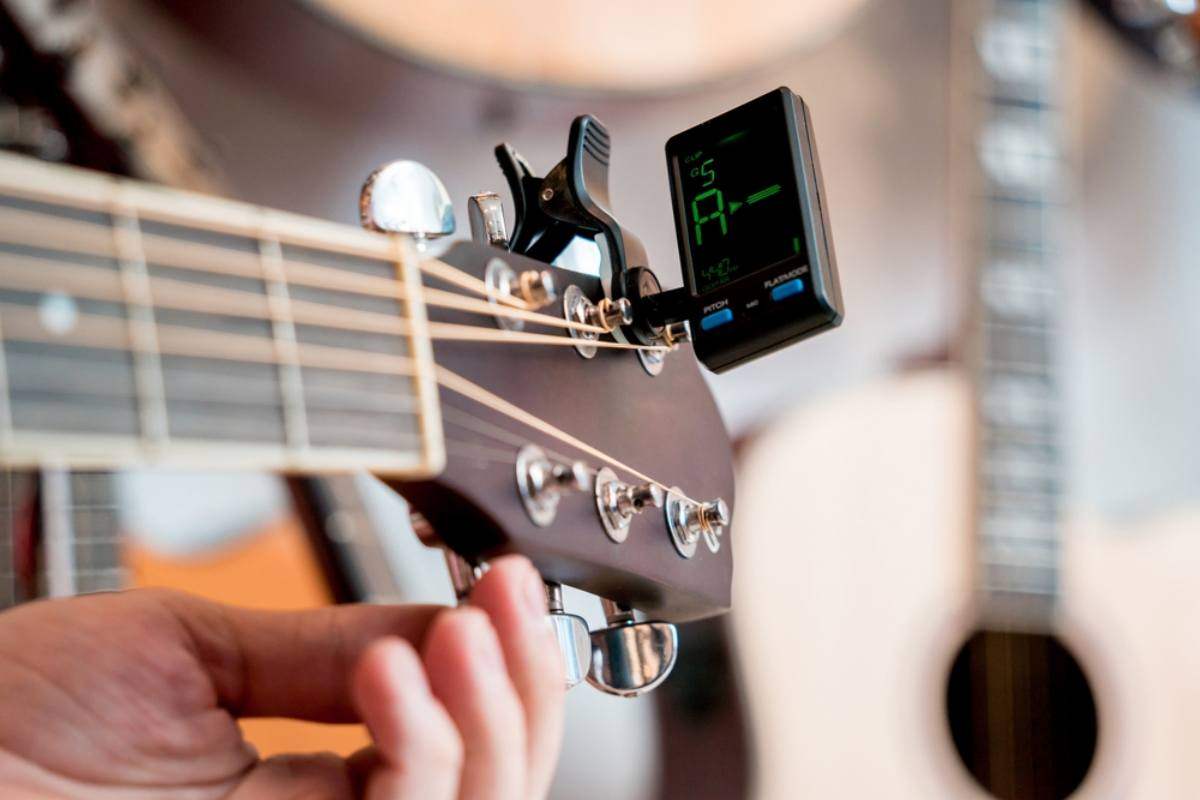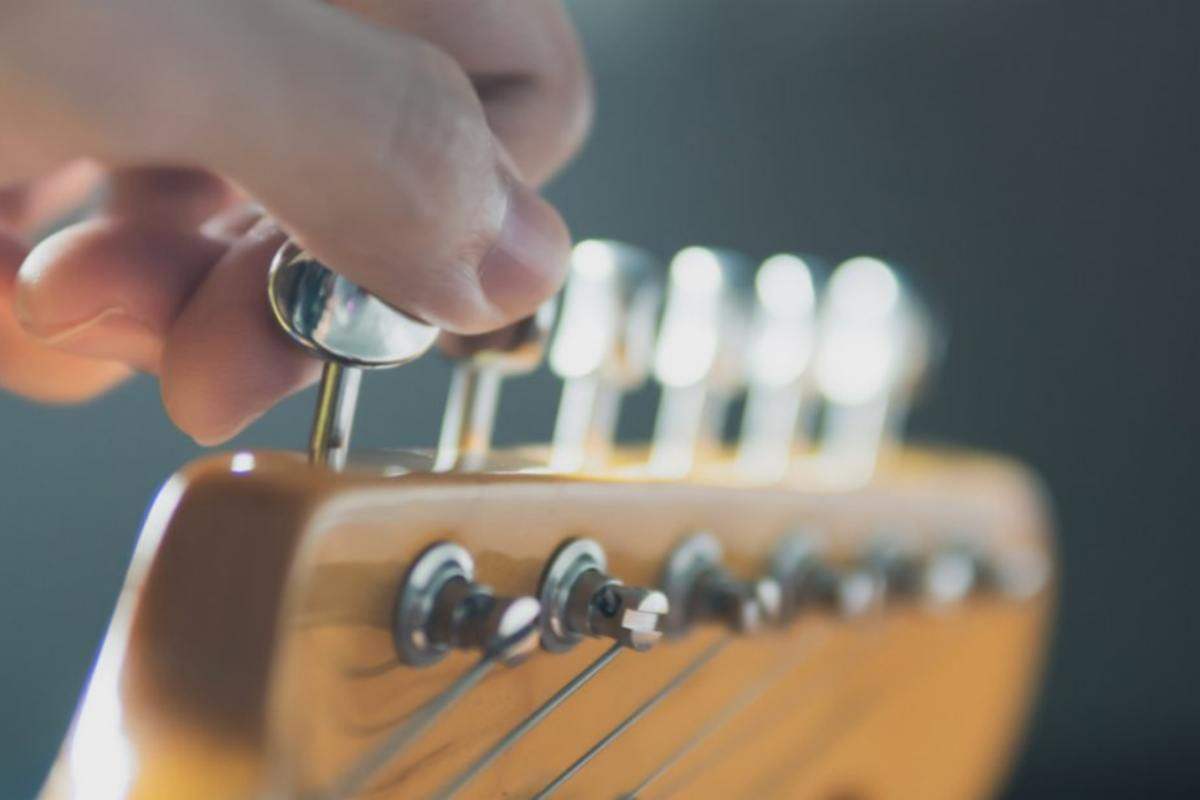Guitar tuners are a crucial part of this instrument, but sadly, most players neglect the importance of having a quality set installed in the headstock. A proper set can make tuning a guitar a breeze, and keep your strings in place for extended periods, not to mention that they’ll simply work the way they’re meant to for longer.
More importantly, many players are actively ruining their guitars by forcing the tuners that don’t match the sockets they’re fitted into.
As a guitar expert with over 15 years of playing and roughly half as much as a tech nut, I’m here to help you understand the differences between a solid set of guitar tuning pegs and a bad one, so let’s open up today’s guitar shop.
What are Guitar Tuning Machines?
Before diving into the nitty-gritty aspects of picking the best tuners for your guitar, let me first preface this by saying that these are metal, brass, bronze, or even gold pieces placed on your guitar’s head. As the name suggests, they’re used for tuning the strings, but more importantly, they are meant to keep strings from moving and falling out of tune.
The quality of your tuning machines influences what we call “intonation quality”. If your guitar sounds off the moment you strum a chord, its intonation is poor. If you have to force the pegs to move, you’re dangerously close to damaging your guitar for good.
Although this can all be somewhat mitigated with regular guitar maintenance, most players have a replacement handy, and it won’t hurt to know what to look for.

How to Choose Guitar Tuning Keys?
There are two “mandatory” factors that you should be aware of, including tuning key orientation and hardware dimensions, as well as several “optional” elements that can help you choose tuners that can make your guitar model perform better.
Let’s start from the top.
Tuning Key Orientation
If you’ve ever been inside a music shop, you probably noticed that some guitars have tuners mounted in pairs of three on each side while others have a set of six placed along the length of the headstock.
The “orientation” of your machine heads must match the specs of the guitar you’re playing. Most acoustic guitars feature 3x3 side-mounted keys while many electric guitars come with six pre-drilled holes for six inline tuners; this is not a rule, though. Inspect your guitar and check how your current tuners are positioned to determine the orientation of your replacement set.
Hardware Dimensions
Guitar tuners are not universal, meaning that they come in a variety of shapes and sizes. Fortunately, modern technologies allow more room for error, as today’s tuners typically come with bushings that can be adjusted so that almost any post can fit.
To stay on the safe side, measure the diameter of each tuning hole of your guitar’s headstock and look for tuners sized as closely to these measurements.
Open or Closed-back Tuners
I briefly mentioned the guitar maintenance part, and if you’re like me and want to keep your hardware as functional as possible, you may want to consider buying open-back tuners.
It’s true that dust won’t have any trouble finding its way into these tuners, but you’ll be able to polish the machine with ease. Closed-back tuners offer no significant advantages other than delaying the invasion of dust and oil.

Consider Upgrading to Lock-on Tuners
If you’re a gigging, touring, or session musician aiming for the pro scene, I can’t recommend locking tuners enough. They fully restrain all string movements when they’re plucked and allow you to remain in tune much longer than regular tuners, although they tend to cost a bit more too.
I should also emphasize that lock-on machine heads tend to weigh a bit more, which can slightly affect your guitar’s playability. I noticed that this effect is barely felt with guitars with 3x3 headstocks.
Invest in a Better Set or Get Bulk Replacements
I’ve had tours with each leg lasting several months, one-time gigs at local towns, and exhausting recording sessions where I played for 10+ hours without pause.
My combined experiences taught me that I should always have one top-tier set of guitar tuning keys fitted to my main guitar, and at least several replacement sets stored in my gig bag.
If you’re on a cash-strapped budget, I warmly recommend setting some money aside for one good-quality set of guitar tuning keys. This way, you won’t have to worry about it breaking or failing you in the middle of your playing.
Understanding the Gear Ratio in Machine Heads
The gear ratio explains how many times the tuner needs to be cranked for the post of the machine head to make a full circle. Typical gear ratios include 11:1, 14:1, or 18:1 but various other options are available on the market.
The smaller the ratio is, the quicker you’ll make a “turn”. I prefer higher ratios because they’re ideal for fine-tuning, but using them also takes a bit more time than machines with lower gear ratios, especially if you’re restringing your guitar.
FAQs
What are the most important things to look for in guitar tuning keys?
The machine head orientation and dimensions are the main important aspects you should consider when buying a new set.
How to adjust guitar tuning keys?
Turning the tuning keys is used in the tuning process to “tighten” or “loosen” the strings. Adjusting the machine heads counter-clockwise will tighten the string, and vice versa.
What are standard guitar tuning notes?
When a guitar is tuned in “E Standard”, its tuning notes include E, A, D, G, B, and E, respectively.
How to replace tuning keys on the guitar?
All existing tuning keys must be first uninstalled by removing all hardware, either by hand or with an appropriate screwdriver. Then, place new machine heads on the headstock, put the washers and sleeves on each post, and then tighten the screws until the pegs are snuggly fitted into their sockets.
Please share this article if you enjoy it!
Be sure to join our FB Group Guyker Guitar Parts & Accessories Community to share your ideas! You can also have connections with like-minded guitar players, Guyker updates as well as discounts information from our FB Group.





